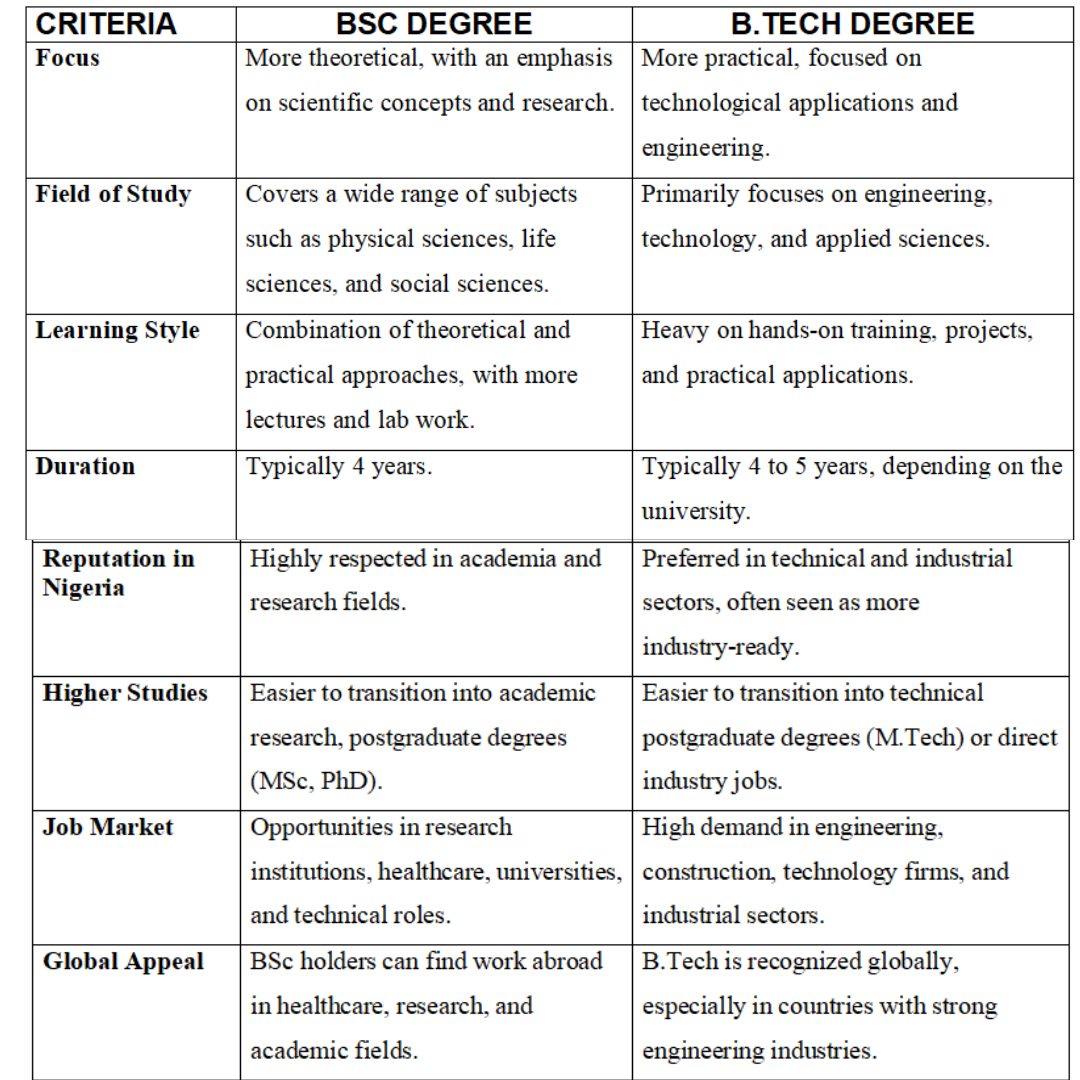The Bachelor of Science (BSc) degree has always been a hot topic in Nigeria. But as we approach 2025, there’s a shift happening, one that’s worth paying attention to if you’re considering a BSc.
Although both BSc (Bachelor of Science) and B.Tech (Bachelor of Technology) degrees are widely accepted in Nigeria, they differ greatly in terms of their structure, concentration, and perceived benefits.
BSc is an undergraduate academic degree offered by universities and colleges worldwide. The study duration of a B.Sc. program is three to four years.
From the differences between the types of degrees to the growing advantages of holding one, this article will dive into why a BSc might be more important than ever for Nigerian students.
And trust me, by the end, you’ll have a better idea of how a BSc degree can shape your future, especially with the changes coming in 2025.
Here is a summary of the BSc distinctions and the benefits of a BSc degree for recent, young applicants.

What Exactly is a BSc Degree?
Before we go into the advantages, let’s clarify what a BSc degree is in Nigeria.
The Bachelor of Science degree is a degree you receive after finishing a 4-year program at a university. Typically awarded in fields like Mathematics, Natural Sciences, Social Sciences, Management Sciences, environmental science, health sciences, finance, and more.
BSc offers a theoretical grounding in scientific concepts, making it a flexible choice for individuals wishing to investigate a variety of career options in academics, research, and professional domains
Unlike its cousin, the Bachelor of Arts (BA), which leans toward creative and theoretical fields, a BSc focuses on practical and technical skills.
Now, the big question is: Why does this matter in Nigeria in 2025?
Key Differences Between a BSc and Other Degrees
Understanding the differences between a BSc and other degrees can help you decide which one suits your career path. Here’s a quick breakdown:
1. Hands-On Learning
A BSc degree places more emphasis on hands-on, practical learning. While a BA might have more essays and theoretical discussions, a BSc involves lab work, experiments, and fieldwork.
It’s the degree for those who prefer getting their hands dirty, literally and figuratively.
2. Career Pathways
One of the main differences is the types of jobs these degrees prepare you for.
A BSc is often your ticket to technical and scientific fields like engineering, IT, and healthcare, which are booming in Nigeria.
In contrast, a BA prepares you for careers in areas like media, education, and the arts.
3. Critical Thinking vs. Technical Skills
BSc students often develop strong technical skills and problem-solving abilities.
While BA programs emphasize critical thinking and communication, a BSc equips students with the know-how to approach complex, technical challenges.
4. Duration of Study
The typical duration for a BSc degree in Nigeria is 4 years, though it can be 3 years depending on the program or university.
The 4 years scale is usually for more specialized courses, such as medicine or engineering, which require a longer study period.
This standard duration is designed to equip students with both theoretical knowledge and practical skills through coursework, lab work, and sometimes industrial attachments.
However, universities can offer extensions if students encounter academic challenges or strikes, which are common in public institutions.
So, if you’re aiming for a career that’s more practical or technology-focused, a BSc might be the better choice.
Advantages of a BSc Degree in Nigeria
Here’s where it gets interesting. There’s a reason the BSc degree is becoming increasingly valuable in Nigeria, especially as we approach 2025.
Let’s break down some of the advantages that could give you an edge in the job market.
1. Growing Demand for Technical Skills
Nigeria’s economy is moving toward industrialization and technological advancement.
Sectors like IT, renewable energy, healthcare, and engineering are expanding rapidly, and they all have one thing in common, they need people with technical skills.
A BSc degree positions you perfectly for these industries.
By 2025, we’re likely to see even more opportunities in these fields, making a BSc degree more advantageous than ever.
2. Higher Earning Potential
While salary isn’t everything, it’s hard to ignore the fact that many careers requiring a BSc degree tend to offer higher earning potential.
Engineers, doctors, pharmacists, and IT professionals typically start with salaries above the national average. And as industries in Nigeria continue to grow, so will the demand for well-trained, technically skilled workers.
3. Global Opportunities
Another major advantage of a BSc degree is the global appeal. Nigerian professionals with a BSc can easily find opportunities abroad, especially in countries where technical expertise is in high demand.
From Europe to the Middle East, the doors are wide open for Nigerian BSc holders, particularly in fields like engineering and IT.
4. Flexibility Across Industries
A BSc degree isn’t limited to one path. You can pivot across different industries with the right specialization.
For example, a BSc in Computer Science opens doors in healthcare, finance, education, and beyond. In Nigeria, this flexibility is critical because it allows professionals to adapt to an ever-changing job market.
5. Innovation and Entrepreneurship
One of the most exciting trends in Nigeria is the rise of tech startups and innovation hubs. With a BSc degree, you’ll have the technical know-how to not just work for companies but also create your own.
Fields like tech and engineering are ripe for innovation, and having a BSc can give you the skills to start your own business or bring new solutions to the market.
BSc vs. B.Tech in Nigeria: Which Degree is Right for You?
In Nigeria, both the BSc (Bachelor of Science) and B.Tech (Bachelor of Technology) degrees are valuable, but they have key differences.
Understanding which one is best for you depends on your career goals, learning preferences, and the field you want to enter. Below is a comparability table to help you decide:

Choose a BSc if:
-
- You enjoy a balance of theory and practice.
- You’re interested in research or academic careers.
- You want flexibility in fields like healthcare, science, or social sciences.
- You plan to pursue higher studies (e.g., MSc, PhD).
Choose a B.Tech if:
-
- You prefer hands-on learning and practical applications.
- You want to enter the engineering or technology sectors directly after graduation.
- You’re interested in fields like IT, mechanical engineering, or construction.
- You want to develop technical expertise with a direct link to industrial applications.

Marketability and Industry Perception of BSc Degree in Nigeria
Overall, a BSc degree is perceived as highly professional, with graduates being favored for jobs that require practical and scientific knowledge.
In contrast, some non-technical fields may require further qualifications or specialization to enhance employability.
In Nigeria, the marketability of a BSc degree is on the rise, especially in fields like engineering, computer science, medicine, and environmental science.
However, the marketability of a BSc varies depending on the field of study, with technical and science-based degrees often seen as more industry-ready compared to their BA counterparts.
Global Recognition & Career Opportunities
A BSc degree from a reputable Nigerian university is widely recognized on a global scale, particularly in fields like engineering, information technology, healthcare, and the natural sciences.
As a graduate, you often have opportunities to pursue further studies abroad or secure jobs in international organizations.
Countries with strong technology and healthcare sectors, such as the United States, Canada, Germany, and the UAE, frequently seek Nigerian professionals with BSc degrees.
Fields like software engineering, data science, oil and gas engineering, and environmental science are particularly attractive.
A BSc degree can also serve as a stepping stone for students looking to pursue advanced degrees (MSc, PhD) in international universities.
Admission Requirements for BSc Degree in Nigeria
To gain admission for a BSc degree in Nigeria, you must meet several requirements. These generally include:
O’Level Results:
Students must have at least five credits, including Mathematics, English, and relevant science subjects (depending on the course), in either WAEC, NECO, or GCE examinations.
UTME/JAMB Score:
Students must score above the cut-off mark in the Joint Admissions and Matriculation Board (JAMB) exam. Each university sets its own minimum score for BSc programs.
Post-UTME:
Some universities require students to pass a post-UTME screening exam, which tests the student’s knowledge in subjects relevant to their chosen field.
Direct Entry:
Candidates with A-level qualifications, diplomas, or other relevant certifications can apply for direct entry, bypassing the first year of study in certain cases.
Top 3 Universities with Good BSc Degrees in Nigeria
1. University of Ibadan (UI)
The University of Ibadan is Nigeria’s premier university, known for its strong emphasis on research and scientific innovation.
It offers top-rated B.S.c programs in fields like medicine, computer science, environmental science, and engineering.

2. University of Lagos (UNILAG)
UNILAG is renowned for producing highly employable graduates in fields such as computer science, marine sciences, and physics.
The university’s location in Lagos also provides students with access to a dynamic business environment and industry connections.

3. Ahmadu Bello University (ABU), Zaria
ABU Zaria is one of the largest universities in Nigeria and offers a wide range of BSc programs with strong reputations in fields like agriculture, medicine, and engineering.
The university is particularly well-regarded for its emphasis on both academic excellence and practical experience.

Conclusion
In 2025, the importance of a B.S.c degree in Nigeria is only set to grow. With the demand for technical skills increasing, higher earning potential, and more opportunities both locally and globally, a BSc could be the right step toward a promising career.
However, if you are more inclined towards hands-on technical work, then a B.Tech might suit you better.
Whether you choose a B.S.c or B.Tech, both degrees offer great career prospects. It’s all about what fits your personal goals and career aspirations in Nigeria’s evolving landscape.
FAQs
1. What is a BSc degree in Nigeria?
A BSc degree (Bachelor of Science) in Nigeria is an undergraduate academic degree awarded after the successful completion of a program focused on science-based courses.
It typically spans 3–4 years, depending on the university and course of study.
2. What are the key differences between a BSc and other degree programs in Nigeria?
The main difference lies in the focus of the study.
While a BSc emphasizes science, technology, engineering, and mathematics (STEM), other degrees like BA (Bachelor of Arts) focus on humanities, social sciences, and arts.
A BSc tends to have a more technical and research-oriented curriculum, which can offer more direct career paths in scientific and technical fields.
3. What are the advantages of earning a BSc degree in Nigeria?
- Job Opportunities: A BSc degree can open doors to diverse career options in fields like technology, engineering, healthcare, research, and more.
- Higher Earning Potential: Graduates with a BSc degree often have higher earning potential compared to those without a degree or with a diploma.
- Skill Development: Students develop a wide range of skills, including critical thinking, research techniques, and technical abilities, making them highly employable.
- Global Recognition: Nigerian BSc degrees from accredited institutions are recognized internationally, providing opportunities abroad.
4. How does a BSc degree impact future education in Nigeria?
A BSc degree can serve as a stepping stone for further studies. Graduates can pursue a Master’s (MSc) or Doctorate (PhD) to deepen their knowledge and skills in a specialized field.
It also allows for interdisciplinary studies and research opportunities.
5. What is the duration of a BSc program in Nigeria?
Typically, a BSc program in Nigeria lasts between 3 to 5 years, depending on the university, course of study, and whether a student takes a year off or repeats a year.
6. Which universities in Nigeria offer the best BSc degrees?
Top Nigerian universities that offer reputable BSc programs include:
- University of Lagos (UNILAG)
- University of Ibadan (UI)
- Obafemi Awolowo University (OAU)
- University of Nigeria, Nsukka (UNN)
- Covenant University
7. Can a BSc degree lead to entrepreneurship in Nigeria?
Yes! Many BSc graduates in Nigeria have leveraged their technical skills to start businesses in fields such as technology, healthcare, research, and engineering.
Entrepreneurship opportunities are expanding, especially with the rise of digital and innovation-based industries.
8. What are some challenges faced by BSc students in Nigeria?
- Limited Resources: Some universities face challenges with funding, equipment, or facilities, affecting practical learning.
- Employment Barriers: Despite the degree, graduates may still face challenges in securing jobs due to limited opportunities or industry competition.
- Cost of Education: The rising cost of education in Nigeria can make it difficult for some students to afford tuition fees and other expenses.
9. Are there any alternative paths for students who don’t pursue a BSc?
Yes, students who don’t pursue a BSc degree can opt for diplomas, certificates, or vocational training in various fields like technology, business, and the arts.
These alternatives can still lead to successful careers, especially with the right skill set and experience.
10. What career fields can a BSc degree lead to in Nigeria?
A BSc degree can open up careers in:
- Engineering: Civil, Mechanical, Electrical, Software, and more.
- Healthcare: Nursing, Medical Laboratory Science, and other health-related fields.
- Technology: Information Technology, Data Science, Software Development.
- Education: Teaching, Research, and Academic positions.
- Environmental Science: Renewable energy, conservation, and environmental consultancy.
